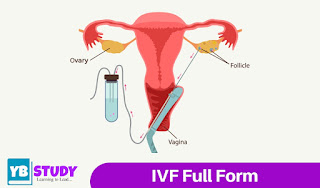IVF Full form : Detail information about IVF
IVF Full form : Detail information about IVF
Today we are sharing information related to IVF with you in this article Hope that whatever you want to know about IVF, you will definitely find it in this post. If you want to know better about IVF Read this article till end.
Throughout the world, IVF Treatment is considered the main method of treating infertility. There is hardly anyone who is not known about IVF. IVF is the only way for families who do not have children.
If we talk, in today’s time, IVF is a very common word that we all have heard. But maybe there will be some people who will know about IVF Full Form. So we are going to read about the IVF Full Form here.
IVF Full Form ?
IVF Full Form is “IN Vitro Fertilization”. It is an assisted reproductive technology (ART) that is used to treat infertility or genetic problems. It helps infertile couples to conceive a child.
This technique involves fertilization of eggs with sperm outside the body in a laboratory dish. Since fertilization occurs outside the body, it is known as in vitro fertilization. After fertilization, the fetus is transferred to the woman’s uterus.
What is IVF ?
In vitro fertilization (IVF) is a process by which egg cells are fertilized by sperm outside the body: in vitro (Latin: in glass; taking place in a test tube). IVF is a major treatment in infertility when other methods of assisted reproductive technology have failed. In this process hormonally controlling ovulatory process.
This involves removing the ova (egg) from the woman’s ovaries and allowing the sperm to be fertilized in a fluid medium. The fertilized egg (zygote) is then transferred to the patient’s uterus with the intention of establishing a successful pregnancy. “Test tube baby”, Louise Brown’s first successful birth was in 1978.
What are the types of IVF
The process of IVF mainly is of three types: Natural IVF, Minimal Stimulation IVF and Conventional IVF. Natural IVF is done through natural eggs, not through eggs prepared by simulations.
Healthy eggs are fed by drug feeding in minimal stimulation IVF. Conventional or traditional IVF is a technique in which eggs and semen are mixed in a dry environment, greatly increasing the chances of reproduction.
When IVF done?
IVF aid is effective in those forms of infertility, when it is not possible to eliminate the cause that prevents conception. For example, after ectopic pregnancy, when one or both fallopian tubes of a woman are removed or after inflammatory diseases, when the patency of the fallopian tubes is broken and it is impossible to correct, IVF can be assisted. Sterility can be overcome.
There are many reasons why you may have to seek IVF help.
- Endometriosis
- Counts low sperm count
- Problems with the uterus or fallopian tubes
- Problems with ovulation
- Antibody problems that damage sperm or eggs
- Inability of sperm to penetrate or survive in cervix
- Ambiguous reproduction problem
Steps of IVF Process
IVF consists of four basic stages which are as follows:
Egg production / stimulation: In this stage, fertility is used to stimulate egg production in the female body. Many eggs are desired because some eggs cannot develop or fertilize after retrieval.
Egg retrieval: This step involves a small surgical procedure to retrieve the egg. An ultrasound imaging guided hollow needle is passed through the pelvic cavity to remove the ovary follicles from the ovary. The follicular fluid is then scanned to extract available eggs.
Fertilization: In this step, the egg is fertilized in the laboratory along with the male’s sperm. Eggs are monitored to ensure that fertilization and cell division are occurring. The embryos are left in culture for 2 to 6 days before being transferred to the uterus.
Embryo Transfer: In this stage, a 4-5 day old embryo is placed in the woman’s uterus using a thin, small catheter or tube. Implantation usually occurs about six to ten days after egg retrieval. After approximately 9 to 12 days, the woman is tested to ensure that the fetus has been safely implanted.
What are the benefits of IVF?
Friends, along with knowing the IVF Full Form, we will also have to know What are the benefits of IVF-
- Happiness of procreation
- Having the privilege of becoming a mother in a woman’s life
- Time saving
- Spend less money
- And eating very few medicines which can affect your liver.
Side Effects of IVF
- IVF often involves placing two fetuses in the womb, which may lead to two or three pregnancies instead of one. This may threaten the mother and baby in many ways.
- Fertility drugs used during this time can also have side effects.
- IVF carries the risk of ectopic pregnancy or ectopic pregnancy or miscarriage.
- Even after conception through IVF, there is a risk of spina bifida spinal problems in the child.
- Apart from this, there is also the risk of bloating, constipation, cramps, breast tenderness, mood swings, headaches, allergic reaction to drugs, bleeding, pelvic pain, blood in urine, fever above 100.5 degrees, vaginal bleeding and infection. .
- This can be very difficult emotionally for the person with the IVF procedure and his or her family or partner.

